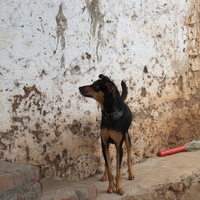Padini Nirmal
Columbia University, The Earth Institute, Department Member
- Geography, Decolonial Thought, Decolonial Theory, Feminist Theory, Two Spirit, Indigeneity, and 22 moreIndigenous thought and theory, Indigenous Studies, India, Critical Development Studies, Adivasi Studies, Ontological Politics, Resistance (Social), Resistance Theory, Feminist Political Ecology, Environmental Justice, Cynthia Enloe, DeGrowth, Food Sovereignty, Indigenous Resistance, Resurgence, Political Ecology, Territory, NatureCultures, Rooted networks, Modernity/coloniality/decoloniality, Decolonization, and Social Movementsedit
Rooted networks provide a conceptual framework that embeds network thinking in nature-society geography in order to investigate socio-ecological relations, while emphasizing the place-specific materiality of these relations. This progress... more
Rooted networks provide a conceptual framework that embeds network thinking in nature-society geography in order to investigate socio-ecological relations, while emphasizing the place-specific materiality of these relations. This progress report examines how geographers have put the framework into scholarly practice. The conceptual approach has enabled researchers to: 1) articulate the territoriality and materiality of networks as assemblages, which may be simultaneously rooted and mobile; 2) discern diverse types of power that flow through network connections; and 3) conduct analyses that unearth multiply-situated knowledges within networks. Challenges emerge as we seek to integrate the approach more fully with disciplinary traditions, including organizing complex relationships into bounded scholarly formats; choosing which aspects of the network are most salient to Putting Rooted Networks into Practice 960 analyze; and illustrating networks for effective communication. We describe...
Research Interests:
Research Interests:
The relationship between nature as ecological place and people as social, political, cultural (etc.) beings has been a central concern within the field of human geography. A critical dimension within this broader field of concern pertains... more
The relationship between nature as ecological place and people as social, political, cultural (etc.) beings has been a central concern within the field of human geography. A critical dimension within this broader field of concern pertains to the relationship between nature as ecological place, and gender, as a structuring force within the social, cultural, economic, political lives of humans. Focusing on the ways in which gender intersects with race, class, coloniality, sexuality, age, nationality, and caste (among other identities) illuminates how such identities structure human relations with nature. As a terrain of ecological and social relations, nature is political and becomes politicized through particular sociohistorical processes.
Research Interests:
A growing coalition of degrowth scholar-activist(s) seeks to transform degrowth into an interdisciplinary and international field bridging a rising network of social and environmental justice movements. We offer constructive decolonial... more
A growing coalition of degrowth scholar-activist(s) seeks to transform degrowth into an interdisciplinary and international field bridging a rising network of social and environmental justice movements. We offer constructive decolonial and feminist critiques to foster their productive alliances with multiple feminisms, Indigenous, post-development and pluriversal thought and design (Escobar, 2018), and people on the ground. Our suggested pathway of decolonial transition includes re-situating degrowth relative to the global south and to Indigenous and other resistance movements. We see this decolonial degrowth as a profoundly material strategy of recovery, renewal, and resistance (resurgence) through practices of re-rooting and re-commoning. To illustrate what we mean by resurgence we draw from two examples where people are engaged in ongoing struggles to protect their territories from the impacts of rampant growth—Zapatista and allied Indigenous groups in Mexico, and three Adivasi communities in the Attappady region of southern India. They are building economies and ecologies of resurgence and simultaneous resistance to growth by deterritorialization. We argue that a decolonized degrowth must be what the growth paradigm is not, and imagine what does not yet exist: our separate and collective socio-ecological futures of sufficiency and celebration in the multiple worlds of the pluriverse. Together, the two cases demonstrate pathways to autonomy, sufficiency, and resurgence of territories and worlds, through persistence, innovation, and mobilization of traditional and new knowledges. We offer these as teachers for the transition to decolonial degrowth.
Research Interests:
In this paper, I place both the methodological and epistemological realms of my doctoral research with the Adivasis (indigenous peoples) of Attappady, Kerala under a queer decolonial feminist lens in order to better understand the nature... more
In this paper, I place both the methodological and epistemological realms of my doctoral research with the Adivasis (indigenous peoples) of Attappady, Kerala under a queer decolonial feminist lens in order to better understand the nature of contemporary Adivasi indigeneity, and indigenous resistance. Given Kerala's unique position within India as a communist state, often acting in the interest of global capitalism by implementing neoliberal polices and steering state-led development plans, its Adivasis are already queer in their relationship to the state as " non-modern others ". In order to understand the often contradictory and complex relationship of the Adivasi with the communist-neoliberal state, beyond being the " marginal other " , I mobilize a queer decolonial feminist framework, through a process I term queering. I use queering to critically examine and analyze contemporary indigeneity and indigenous resistance in two stages. Firstly, through
